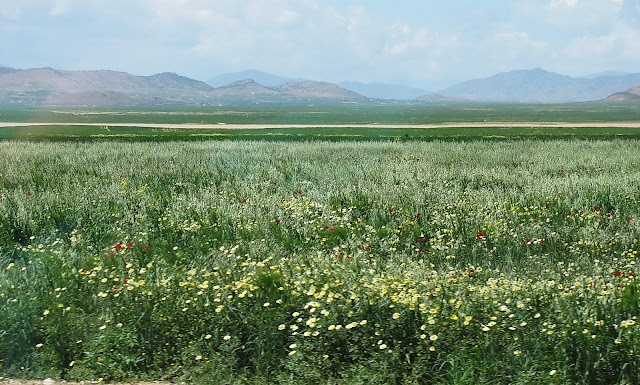Morocco
is famous for many things; tajines, kaftans, lanterns and mysterious
blue robed men leading camels amongst them. One of its most, if not
the most renowned image of Morocco, is of grand red stone kasbahs
perched on cliff tops or dusty river banks. These enormous fortress
like homes are all over the country and are remnants of a life not so
long past.
Foreigners
are presented with a very romantic view of kasbah life. One of
billowing, colourful drapes, cosy cushioned corners, luxurious room
and protective walls sheltering lush palm tree filled gardens from
the external extremes. If you go on 'all knowing' Google you find
pages and pages of examples of just this kind of kasbah; rose petal
littered footpaths, spa rooms and swimming pools. While this is now
the most common use of these grand buildings they have a much more
practical past. Like English castles, only far more abundant and
slightly less regal, these places were the centre and defence of all
village life.
When
taking a tour of the Southern Atlas Mountains a few months ago we
visited Dades Gorge. This lush valley is one of a few green oases
that cut along the middle of the barren and near waste-land that runs
along the south of the Atlas and north of the Sahara. Spread out
along the 25 kilometre valley are over twenty enormous kasbahs. Most
have fallen into disrepair. Some have been maintained and are still
lived in by locals, some have been given a major face lift and are
now grand hotels.
While we
stayed in the gorge we were taken by a local guide to visit an old
crumbling kasbah across the river. Walking around this giant ruin of
a place we got a bit of an insight into real kasbah life.
Kasbah
life was still the way of life for many Berbers as recently as 20-25
years ago. Our guide said 15 years ago, but knowing Moroccan sense of
time I take this as an underestimate. The kasbah was used as a way of
initially protecting families and livestock from wild animals and
enemies. This was originally other tribes, but later in battles with
the French while fighting the protectorate. The tall mud walls made
from straw, local clay and goats hair had few windows and acted as a
fortress. Inside the kasbah there was a 'fire room'. A large open air
area which was used for making great big fires when they were under
attack. This was to signal distress to other kasbahs in the area.
Although very large, inside the kasbah walls many families would live
along with the animals. There would be kids and goats everywhere with
very little private space or peace and quiet. It was cramped and
smelly.
 |
| The fire room. |
 |
| The old kasbah wash room. |
After the
French released control of Morocco in 1955 Kasbah life slowly begun
to disintegrate. With no more enemies and relative calm, locals began
to appreciate the space and quiet that could be had by moving away
from the kasbah. Simply by gaining permission from the local tribe
leader it was possible to build a private home with space for animals
and agriculture. Our guide said he spent his early childhood in the
kasbah and talked of the 'freedom and peace' of living in relative
isolation now.
Sadly,
when people leave these majestic buildings there is no need to keep
repairing the roof and walls. When damp gets in the walls quickly
weaken and then crumble. The roof timbers get taken for fire wood and
what was the strength and centre of the community for over a hundred
years becomes a ruin in less than 30 years.
While
visitors are usually given an unrealistic kasbah life experience, it
is our romantic notion of this life that keeps us coming. Without
this interest a far greater number of these incredible places would
soon disappear into dust. A part of Moroccan history only kept alive
by slightly misleading movie sets like Ait Benhadou.



















































